一般、特殊、选择疑问句专题讲解(附习题答案)
小学英语一般疑问句和特殊疑问句(附练习题)

一、一般疑问句1、定义: 用Yes或No作答的疑问句叫一般疑问句。
2、特点:1、以be动词am/is/are、助动词do/does、情态动词can/could/may、there be(即there is /are)开头;例:Is your father a teacher?/ Does Tom like apples? /Can Jenny speak English? /Is there a book on the desk?2、往往读升调3、陈述句变成一般疑问句的方法:1> 看陈述句中有没有be动词(am、is、are、was、were)或情态动词(can/could/may),如果有,将其提到句首,句末打上问号即可。
例:It is rainy now→Is it rainy now?Tom's father can play the piano.→Can Tom's father play the piano?There is a book on the desk.→Is there a book on the desk?2>如果句中没有be动词或情态动词,句首加do的相应形式(do、does、did),且原句的谓语动词要变回原形。
1.They go to school by bike. →Do they go to school by bike?2.Bill gets up at 6:30 every day. →Does bill gets up at 6:30 every day?3.The students saw a film yesterday. →Did the students see a film yesterday?注: 1.如果陈述句中有第一人称,则变问句时要变为第二人称。
I usually have lunch at school. →Do you usually have lunch at school?2.如果陈述句中有some, 则变问句时往往要变成any 。
英语一般疑问句和特殊疑问句的讲解及练习

一般疑问句用Yes或No作答的疑问句叫一般疑问句。
其结构是be动词(am /is/are ) /助动词/情态动词+主语+其他成分通常回答为:肯定:Yes,+主语+提问的词.否定:No,+主语+提问的词+not.Are you from Japan﹖ Yes ,I am. / No, I'm not.Is her sister doing her homework now﹖ Yes, she is. / No, she isn't.Does he work in a bank﹖ Yes, he does. / No, he doesn't.Can you speak French﹖ Yes, I can. / No, I can't.一: 般疑问句还有下列特点:1、以be动词、助动词或情态动词开头;例:Is your father a teacher Does Catherine like animals Can Jenny speak French二: 如何将陈述句变成一般疑问句要将陈述句变成一般疑问句,可以遵循下列步骤:1.如句中有be 动词(am、is、 are、 was、 were)情态动词(can、may、must …)或助动词(do、does、did、 have、 had(完成时中))时,可直接将它们提到句首,句末打上问号即可。
主语为第一人称,应将其改为第二人称。
例: It was rainy yesterday.→Was it rainy yesterdayTom's father can play the piano.→Can Tom's father play the pianoI have finished my homework.→Have you finished your homework2.如果句中没有be动词、助动词或情态动词,则根据谓语动词的形式借助do的相应形式放在句首。
(完整版)英语一般疑问句和特殊疑问句的讲解及练习

一般疑问句用be动词(am /is主语+其他成分,+主语+提问的词.否定:No,+主语+提问的词+not.Are you from Japan﹖Yes ,I am./ No, I'm not.Is her sister doing her homework now﹖Yes, she is./ No, she isn't.Does he work in a bank﹖Yes, he does./ No, he doesn't.Can you speak French﹖Yes, I can./ No, I can't.一: 般疑问句还有下列特点:1、以be动词、助动词或情态动词开头;例:Is your father a teacher? Does Catherine like animals? Can Jenny speak French?二: 如何将陈述句变成一般疑问句?1.如句中有be 动词(am、is、are、was、were can、may、must …)或助动词(do、does、did、have、had(完成时中))时,可直接将它们提到句首,句末打上问号即可。
主语为第一人称,应将其改为第二人称。
例:It was rainy yesterday.→Was it rainy yesterday?Tom's father can play the piano.→Can Tom's father play the piano?I have finished my homework.→Have you finished your homework?2.如果句中没有be动词、助动词或情态动词,则根据谓语动词的形式借助do的相应形式放在句首。
具体方法是:如果谓语动词是原形,则借do;如果谓语动词是一般现在时第三人称单数形式,则借does;如果谓语动词是过去式,则借did. 需要注意的是,借does或did后,原句的谓语动词要变回原形。
一般疑问句,特殊疑问句,选择疑问句,反义疑问句的详细用法
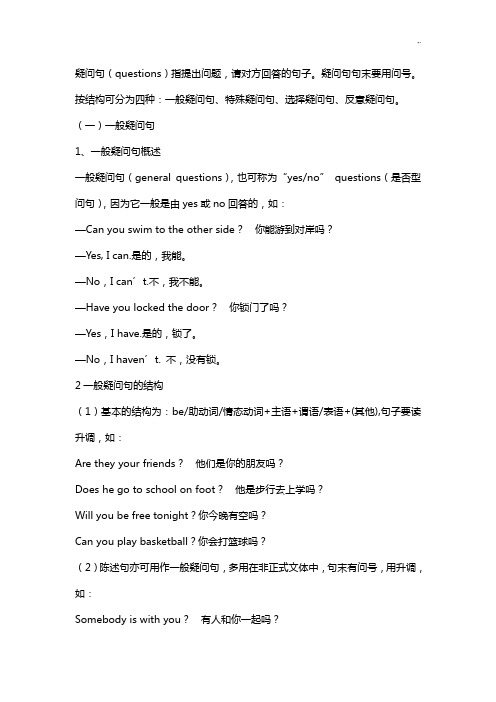
疑问句(questions)指提出问题,请对方回答的句子。
疑问句句末要用问号。
按结构可分为四种:一般疑问句、特殊疑问句、选择疑问句、反意疑问句。
(一)一般疑问句1、一般疑问句概述一般疑问句(general questions),也可称为“yes/no”questions(是否型问句),因为它一般是由yes或no回答的,如:—Can you swim to the other side?你能游到对岸吗?—Yes, I can.是的,我能。
—No,I can’t.不,我不能。
—Have you locked the door?你锁门了吗?—Yes,I have.是的,锁了。
—No,I haven’t. 不,没有锁。
2一般疑问句的结构(1)基本的结构为:be/助动词/情态动词+主语+谓语/表语+(其他),句子要读升调,如:Are they your friends?他们是你的朋友吗?Does he go to school on foot?他是步行去上学吗?Will you be free tonight?你今晚有空吗?Can you play basketball?你会打篮球吗?(2)陈述句亦可用作一般疑问句,多用在非正式文体中,句末有问号,用升调,如:Somebody is with you?有人和你一起吗?He didn’t finish the work?他没有做完活吗?You are fresh from America,I suppose?我猜,你刚从美国回来吧?3、一般疑问句的答语(1)一般疑问句一般由yes或no来回答,如:—Are you tired?你累了吗?—Yes,I am.是的,累了。
—No, I’m not.不,不累。
—Does she do the cleaning?她扫除了吗?—Yes ,she does.是的,她打扫了。
—No,she doesn’t.不,她没打扫。
(2)回答一般疑问句除了用yes或no外,也可用certainly,probably,perhaps,of course,all right,with pleasure等代替yes,用never,not at all等代替no,如:—Can you help me?你能帮个忙吗?—Certainly.当然。
一般疑问句、特殊疑问句、选择疑问句、反义疑问句地详细用法
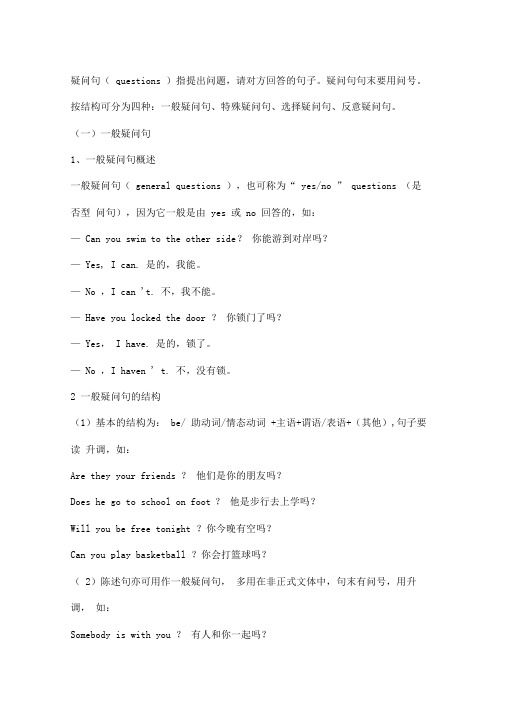
疑问句( questions )指提出问题,请对方回答的句子。
疑问句句末要用问号。
按结构可分为四种:一般疑问句、特殊疑问句、选择疑问句、反意疑问句。
(一)一般疑问句1、一般疑问句概述一般疑问句( general questions ),也可称为“ yes/no ” questions (是否型问句),因为它一般是由 yes 或 no 回答的,如:— Can you swim to the other side ?你能游到对岸吗?— Yes, I can. 是的,我能。
— No ,I can 't. 不,我不能。
— Have you locked the door ?你锁门了吗?— Yes, I have. 是的,锁了。
— No ,I haven ' t. 不,没有锁。
2 一般疑问句的结构(1)基本的结构为: be/ 助动词/情态动词 +主语+谓语/表语+(其他),句子要读升调,如:Are they your friends ?他们是你的朋友吗?Does he go to school on foot ?他是步行去上学吗?Will you be free tonight ?你今晚有空吗?Can you play basketball ?你会打篮球吗?( 2)陈述句亦可用作一般疑问句,多用在非正式文体中,句末有问号,用升调,如:Somebody is with you ?有人和你一起吗?He didn ' t finish the work ?他没有做完活吗?You are fresh from America , I suppose ?我猜,你刚从美国回来吧?3、一般疑问句的答语( 1)一般疑问句一般由 yes 或 no 来回答,如:— Are you tired ?你累了吗?— Yes,I am. 是的 ,累了。
— No, I ' m not. 不,不累。
— Does she do the cleaning ?她扫除了吗?— Yes , she does. 是的,她打扫了。
初中英语语法特殊疑问句专题讲解练习
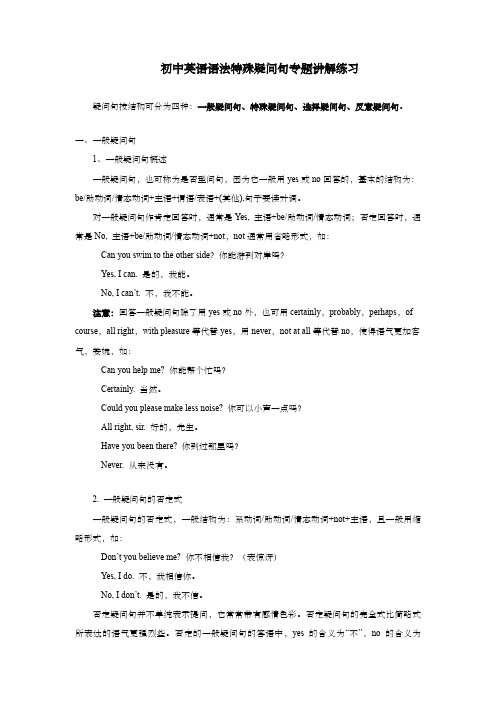
初中英语语法特殊疑问句专题讲解练习疑问句按结构可分为四种:一般疑问句、特殊疑问句、选择疑问句、反意疑问句。
一、一般疑问句1、一般疑问句概述一般疑问句,也可称为是否型问句,因为它一般用yes或no回答的,基本的结构为:be/助动词/情态动词+主语+谓语/表语+(其他),句子要读升调。
对一般疑问句作肯定回答时,通常是Yes, 主语+be/助动词/情态动词;否定回答时,通常是No, 主语+be/助动词/情态动词+not,not通常用省略形式,如:---Can you swim to the other side?你能游到对岸吗?---Yes, I can. 是的,我能。
---No, I can’t. 不,我不能。
注意:回答一般疑问句除了用yes或no外,也可用certainly,probably,perhaps,of course,all right,with pleasure等代替yes,用never,not at all等代替no,使得语气更加客气,委婉,如:---Can you help me? 你能帮个忙吗?---Certainly. 当然。
---Could you please make less noise? 你可以小声一点吗?---All right, sir. 好的,先生。
---Have you been there? 你到过那里吗?---Never. 从来没有。
2. 一般疑问句的否定式一般疑问句的否定式,一般结构为:系动词/助动词/情态动词+not+主语,且一般用缩略形式,如:---Don’t you believe me? 你不相信我?(表惊讶)---Yes, I do. 不,我相信你。
---No, I don’t. 是的,我不信。
否定疑问句并不单纯表示提问,它常常带有感情色彩。
否定疑问句的完全式比简略式所表达的语气更强烈些。
否定的一般疑问句的答语中,yes的含义为“不”,no的含义为“是”,但在回答这类句子时,应该注意yes后接肯定结构,no后接否定结构,这和汉语习惯不同。
(完整版)一般现在时和特殊疑问句讲解及练习
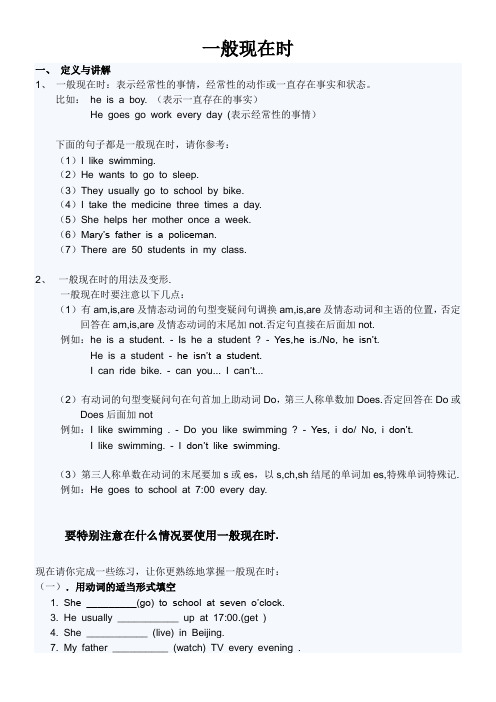
一般现在时一、定义与讲解1、一般现在时:表示经常性的事情,经常性的动作或一直存在事实和状态。
比如:he is a boy. (表示一直存在的事实)He goes go work every day (表示经常性的事情)下面的句子都是一般现在时,请你参考:(1)I like swimming.(2)He wants to go to sleep.(3)They usually go to school by bike.(4)I take the medicine three times a day.(5)She helps her mother once a week.(6)Mary’s father is a policeman.(7)There are 50 students in my class.2、一般现在时的用法及变形.一般现在时要注意以下几点:(1)有am,is,are及情态动词的句型变疑问句调换am,is,are及情态动词和主语的位置,否定回答在am,is,are及情态动词的末尾加not.否定句直接在后面加not.例如:he is a student. - Is he a student ? - Yes,he is./No, he isn’t.He is a student - he isn’t a student.I can ride bike. - can you... I can’t...(2)有动词的句型变疑问句在句首加上助动词Do,第三人称单数加Does.否定回答在Do或Does后面加not例如:I like swimming . - Do you like swimming ? - Yes, i do/ No, i don’t.I like swimming. - I don’t like swimming.(3)第三人称单数在动词的末尾要加s或es,以s,ch,sh结尾的单词加es,特殊单词特殊记.例如:He goes to school at 7:00 every day.要特别注意在什么情况要使用一般现在时.现在请你完成一些练习,让你更熟练地掌握一般现在时:(一).用动词的适当形式填空1. She _________(go) to school at seven o’clock.3. He usually ___________ up at 17:00.(get )4. She ___________ (live) in Beijing.7. My father __________ (watch) TV every evening .9.________ Amy _________ (read) English every day10. Chen Jie sometimes _________(go)to the park with her sister.(二).选择填空1.I want____homework now.A. doingB. to doC. to do myD. do my2.It's time______.A. go to schoolB. play gamesC. to go homeD. to do my homeworks3.______go and help her.A. Let's meB. Let's usC. Let'sD. Let's to4.Do they have a new car? Yes,_____.A .they are B.they have C. they don't D. they do5.He often _________ supper at 6:00 in the evening.A. haveB. has c. is having D. is eating6. We _____________ any Chinese classes on Friday.A. are havingB. aren’t havingC. don’t haveD. are have(三)、用括号内动词的适当形式填空。
小学英语一般疑问句和特殊疑问句(附练习题)
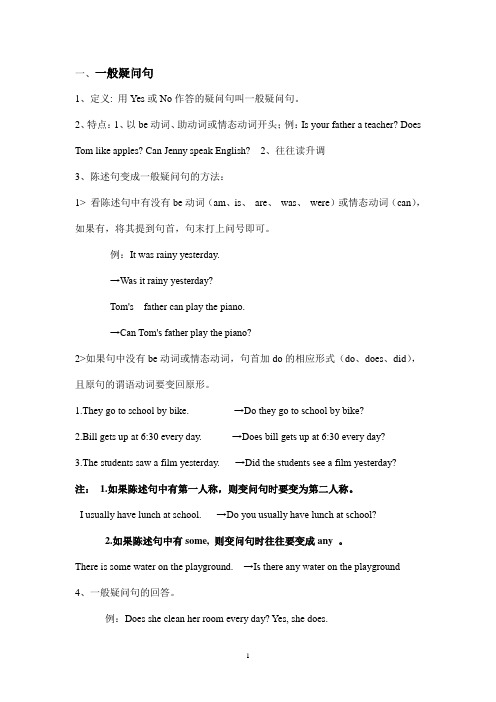
一、一般疑问句1、定义: 用Yes或No作答的疑问句叫一般疑问句。
2、特点:1、以be动词、助动词或情态动词开头;例:Is your father a teacher? Does Tom like apples? Can Jenny speak English? 2、往往读升调3、陈述句变成一般疑问句的方法:1> 看陈述句中有没有be动词(am、is、are、was、were)或情态动词(can),如果有,将其提到句首,句末打上问号即可。
例:It was rainy yesterday.→Was it rainy yesterday?Tom's father can play the piano.→Can Tom's father play the piano?2>如果句中没有be动词或情态动词,句首加do的相应形式(do、does、did),且原句的谓语动词要变回原形。
1.They go to school by bike. →Do they go to school by bike?2.Bill gets up at 6:30 every day. →Does bill gets up at 6:30 every day?3.The students saw a film yesterday. →Did the students see a film yesterday?注: 1.如果陈述句中有第一人称,则变问句时要变为第二人称。
I usually have lunch at school. →Do you usually have lunch at school?2.如果陈述句中有some, 则变问句时往往要变成any 。
There is some water on the playground. →Is there any water on the playground4、一般疑问句的回答。
- 1、下载文档前请自行甄别文档内容的完整性,平台不提供额外的编辑、内容补充、找答案等附加服务。
- 2、"仅部分预览"的文档,不可在线预览部分如存在完整性等问题,可反馈申请退款(可完整预览的文档不适用该条件!)。
- 3、如文档侵犯您的权益,请联系客服反馈,我们会尽快为您处理(人工客服工作时间:9:00-18:30)。
“一般疑问句”【概念】: 一般疑问句是指用Yes / No来回答的疑问句,读时要用升调。
eg: ---Is this your pencil 这是你的铅笔吗---Yes, it is. 是的,它是。
:--- Are those bananas 那些是香蕉吗--- No, they aren’t. 不,它们不是。
【结构】:1. 连系动词be +主语+其他回答时主语必须为相应的人称代词,且为主格形式。
肯定回答:Yes, 主语+ be.否定回答:No, 主语+ be not.be和not可缩写为:isn’t, aren’t, wasn’t, weren’t【例句】①—Are they all here 他们都在这儿吗—Yes, they are. / No, they aren’t. 是的,他们都在。
/不,他们不在。
)②—Is your father a musician—No, he is.2. 情态动词+ 主语+动词原形+其他肯定回答:Yes, 主语+情态动词.否定回答:No, 主语+情态动词+ not.情态动词和not可缩写为:can’t, mustn’t, needn’t, shouldn’t.【例句】①— Can the boy play the guitar 那个男孩会弹吉他吗---Yes, he can. / No, he can’t. 是的,他会。
/ 不,他不会。
②—Can you swim—Yes, I can.[3. 助动词( Do / Does / Did)+主语+动词原形+其他肯定回答:Yes, 主语+ do / does / did.否定回答:No, 主语+ do / does / did+ not.(助动词和not也常用缩写形式:don’t, doesn’t, didn’t.【例句】①—Do you want to go to the movie 你想去看电影吗—Yes, I do. / No, I don’t. 是的,我想去。
/ 不,我不想去。
②—Did they go on vacation last weekend—No; they didn’t^学习小贴士【一般疑问句的问答】:回答一般疑问句时有肯定回答和否定回答两种方式,肯定回答以Yes开头,否定回答用No开头。
但对一般疑问句的回答也不是一成不变的,有时肯定回答还可以用OK./Certainly.等;否定回答可以用Sorry. / Sorry, I can’t. / Sorry, I’m afraid not.等句式。
【例句】①— Can you speak English 你会说英语吗—,—Certainly/ Of course. 当然会。
—Sorry, I can’t. 对不起,我不会。
②— Can I help you —Yes, please. I want a red skirt.一般疑问句练习题一.请把下列陈述句变为一般疑问句。
1. His father is an English teacher._________________________________________2. His father goes to work by bus._________________________________________3. His birthday is on the twentieth of November._________________________________________4. She wants a cup of coffee._________________________________________5. The children had a good time in the park._________________________________________6. My parents can play tennis.________________________________________7. I have many books about English.:________________________________________二.请把下列肯定句变为否定句。
1. He likes English._________________________________________ .2. They are from Australia._________________________________________ .3. Kitty is wearing her new uniform._______________________________________ .4. Tom and Kitty watch TV at night.________________________________________ .5. Jim has some story-books.`________________________________________ .特殊疑问句意思用法例句。
who 谁问人的身份,姓名等He is LiLie Who is heHe is my brother.Who is hewhat什么问人的职业或事物是什么?He is a worker.What is heHe has a book. What does he havewhose谁的问所属关系This is her book.Whose book is thisThis book is hers. Whose is this bookwhat color、什么颜色问颜色(表语)My skirt is red. What color is yourskirtwhat time几点问点时间We play games at five in the afternoonWhat time do you play games| when 什么时候问时间We play games in the afternoonWhen do you play gameswhere什么地方问地点(状语)!We play games at home on SundayWhere do you play games on Sunday why为什么问原因He isn't at school today because he isill.Why isn't he at school todayhow¥怎样问健康状况、做事的方式等He is fine/strong. How is heI go home by bike. How do you go homehow old多大几岁问年龄!He is ten.How old is hehow many多少跟复数名词,问数量There are thirty boys in my class.How many boys are there in your classhow much多少!跟不可数名词问数量或价钱There is some milk in the bottle. How much milk is there in the bottlehow far多远问路程It's five kilometers away from here$How far is it from herehow soon多久问in+一段时间He can finish it in half an hour.How soon can he finish ithow long多久)问一段时间;问物体的长短He has lived here for a year. How long has he lived hereThe desk is one meters long. How long is the desk※注意特殊疑问句语序的运用①对句子的主语提问,其语序是:疑问词+谓语+其他(整句是陈述句语序)—eg: --She is their teacher. ---Who is their teacher②对句子主语的定语部分提问,其语序是:疑问词+主语(即定语所修饰的名词)+谓语+其他eg: ---My book is over there. ----Whose book is over there③对表语或宾语的定语部分提问,其语序是:疑问词+表语或宾语+一般疑问句eg: ---I'm looking for my watch. ---Whose watch are you looking for~④对表语、宾语或状语提问,其语序是:疑问词+一般疑问句eg: ---He lives in Beijing . ----Where does he live⑤对谓语和宾语提问,其语序是:疑问词(What) +一般疑问句(其中谓语动词要用do 的相对应形式代替, 省略掉宾语)He watches TV in the evening What does he do in the eveningHe watched TV yesterday evening. What did he do in the eveningHe is watching TV now. What is he doing now|语法专项练习题I.对画线部分提问。
1. They bought a new bike yesterday.____________________________________________________2. She is a nurse .____________________________________________________、3. His mother is thin and tall.____________________________________________________4. I get up at six .____________________________________________________5. I am from Hubei .____________________________________________________6. I went to school late because I got up late.____________________________________________________、7. It is windy ._____________________________________________________8. It’s about two kilometers from his home to his office.______________________________________________________9. My bag is red .______________________________________________________10. I wash it twice a week .______________________________________________________#11. These T-shirts are 25 dollars.______________________________________________________12. It takes Tom 15 minutes to go to school by bus.______________________________________________________选择疑问句一、【定义】:!表示提供两种或两种以上的情况,要求对方在所提供的范围、对象内选择。
